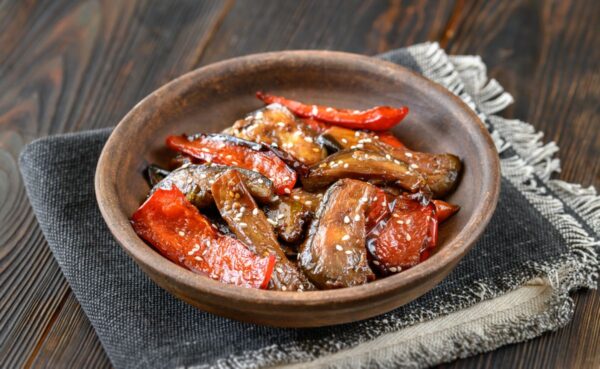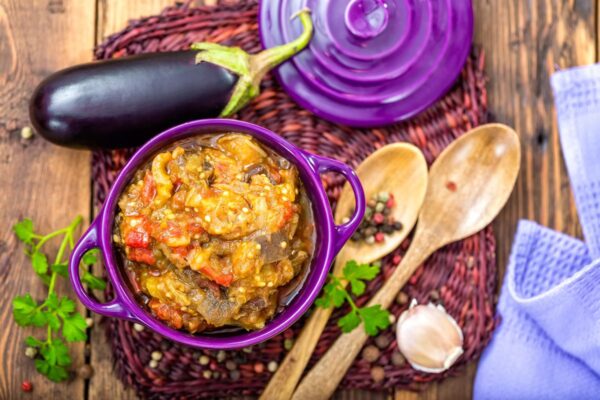With so many foods blacklisted after being diagnosed with a fatty liver, you end up not knowing for sure what you are allowed to eat and what not. Today, I’m here to talk to you about eggplants and fatty liver / NAFLD.
The (main) culprits for a fatty liver are carbohydrates and too much fat. So, if you’re feasting on lots of unhealthy foods, which many of us are – slow down and think about eating more fruits and vegetables. Eggplant is one and it is good for fatty liver – no, it’s great for fatty liver!
Generally, fruits and vegetables are going to have positive effects on a fatty liver. The nutrients in fruits and vegetables may even reverse the effects of fatty liver disease, especially if you pair them up with some exercise and lifestyle changes.
I personally reversed mine and eggplants were part of my diet – but first, let’s get some things out of the way for starters.
Is Eggplant Good for Fatty Liver?

The answer is a resounding YES, and here’s why: it’s a naturally occurring food high in nutrients, while also low in fat or carbs. This is exactly what the liver needs.
Because eggplant is naturally occurring – it has fewer chemicals and man-made ingredients. In other words, it is not processed, so you only feed your body the good stuff.
Your liver acts as a filter for your body. Everything you consume goes through your liver which is why you should put simple, healthy foods into it.
In A Guide to What and How to Eat, it’s mentioned that excess of simple carbohydrates like sweets and starchy items get converted into fat by the liver which eventually overwhelm it.
Vegetables like eggplant help the liver because of their high fiber content. Fiber helps your body get rid of excess fat and it reduces inflammation – two things a fatty liver could use help with.
Eggplant also happens to be low in starch and high in other vitamins and minerals, making it a vegetable worth eating – with or without fatty liver disease.
Why is eggplant good for fatty liver?
Eggplant is a great choice for fatty liver. Because it’s a vegetable, it doesn’t have chemicals or highly processed ingredients that may irritate your liver. (Although it may have pesticides so be sure to wash your veggies or purchase organic.)
Aside from that, great benefits of eggplant are the fiber, antioxidants, and minerals.

Fiber works to protect your liver. According to an article in Nature Communications, fiber has beneficial effects on liver fat content and it’s associated with a 31% reduced risk of liver cancer.
Because fatty liver is the liver’s inability to process excess fat (leaving fat deposits to sit in your liver and cause inflammation and scarring), eating fibrous foods is vital.
Antioxidants are also a vital part of reversing or helping with fatty liver, and eggplant has a ton!
Too many free radicals in the liver cause oxidative stress which can lead to liver diseases, according to Antioxidants in Liver Health. The antioxidants in eggplant help protect your liver by reducing free radicals.
Eggplant is also a good source of magnesium – an important mineral for liver health. In Magnesium Intake and Mortality…, it’s suggested that people who take magnesium have a reduced risk of “mortality due to liver disease.”
This is relevant because in the same article, it is suggested that people with fatty liver disease are at risk of low magnesium levels.
How much eggplant is safe to eat with fatty liver?
Eggplant does contain solanine which acts as a poison in humans, according to The Encyclopedia of Nutrition and Good Health. The amount is very small though – and shouldn’t cause any issues.
However, just to stay on the safe side, don’t eat pounds and pounds of eggplants on a daily basis. Like with all things related to NAFLD – moderation is key!
I always told my son when he was little he can eat as many vegetables and fruits as he wants; this generally goes with eggplants also, but don’t take it literally.
This actually means that you shouldn’t stay away from fruits and vegetables, but always practice some kind of moderation.
The key is to listen to your body.
If you’ve eaten copious amounts of eggplant and are feeling nauseous or otherwise not yourself – maybe you’ve eaten too much. Keep in mind, eggplant is not the only plant with solanine.
Everyday foods like apples, potatoes, and tomatoes contain it as well – so you may have already consumed it without realizing it.
If you plan on incorporating eggplant into your diet – eat it in moderation, as you would anything else. What’s more important when eating eggplant is the method of cooking. We’ll talk about this below!
How to healthily cook eggplant for fatty liver?

Eggplant is often fried – which is not good for fatty liver due to the added saturated fats, trans fats, and carbohydrates. You’ll find fried eggplant on pizza and other various dishes.
Frying (or adding sugars) is a way to make a healthy food unhealthy. Even the healthiest food out there will become harmful if you fry it or if you add a few scoops of sugar on top. So make sure to cook all your food right!
When cooking eggplant, use only a small amount of extra virgin olive oil. Eggplant is extremely porous and will quickly soak up whatever cooking oil you’re using. Ensure it’s a healthy oil and use it in moderation.
Healthy methods of cooking are roasting, steaming, sauteing, or baking – my favorite is roasting. You should try to use these instead of the added oil. I got used to cooking without oil and the effect on taste is not as bad as you might think.
For added nutrients, mix your eggplant with a variety of vegetables and toss them in olive oil, herbs/ spices, and light salt and pepper. Spread them onto a cookie sheet and roast at 425 degrees for 15 to 20 minutes.
You can also read about my favorite way of eating eggplants in my article sharing over 15 fatty liver-friendly recipes, or the one where I share some lunch ideas.
Conclusion
Eggplant is a great option for fatty liver disease and it can be an active part of your diet. Because eggplant has so many vital nutrients to your liver, you can eat it with peace of mind.
It’s a good source of fiber, antioxidants, and magnesium – all of which significantly contribute to a healthy liver.
You can eat a lot of eggplant, but keep in mind it does contain solanine which can be poisonous to humans in large amounts (amounts you may never reach). Cook eggplant in a healthy way, and never eat it fried!

I was diagnosed with a fatty liver back in 2014 and managed to reverse it by mid-2015. Since then, I’ve been studying it, continuously updating my knowledge with the latest scientific findings and practical approaches to give others the help they need to reverse their condition.
My approach to managing fatty liver is holistic, balancing scientifically-backed information with real-life, practical advice based on personal, direct experience.
I am also the admin of the Fatty Liver Support Group on Facebook and the Fatty Liver Subreddit.

